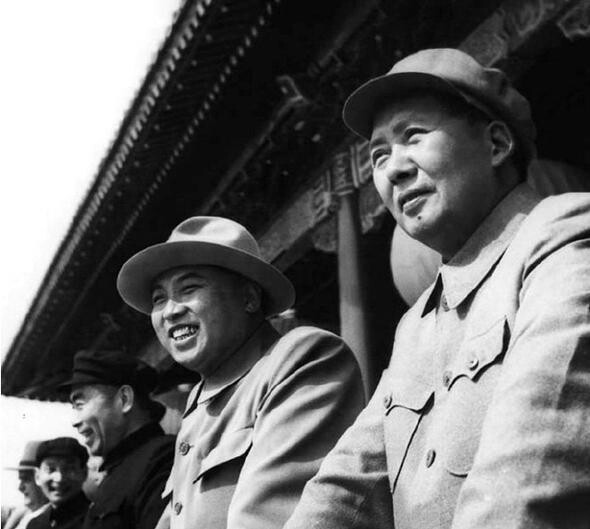hankyoreh
Links to other country sites 다른 나라 사이트 링크
Recent report reveals Mao’s implicit objection to NK developing nuclear weapons

Former Chinese leader Mao Zedong expressed objections in the 1960s to North Korea’s development of nuclear weapons, a recent report says.
The news comes amid growing interest in Beijing’s response to North Korea’s recent fourth nuclear test.
According to a Jan. 12 report in Japan’s Mainichi Shimbun newspaper, Mao discussed China’s nuclear program with then-North Korean Premier Kim Il-sung during an Oct. 1964 visit by the latter, just after China’s first successful nuclear test.
“China has a large population, and it’s a big country. We need to consider face. That’s why we developed nuclear weapons,” Mao was quoted as telling Kim.
“Does Choson [North Korea] really need to go to that length?” he was reported as asking.
According to the newspaper, the story was confirmed from audio recordings of a Korean Workers’ Party official speaking at an internal talk following North Korea’s third nuclear test in Feb. 2013.
Mao was also reported as having summoned an official with the People’s Liberation Army in front of Kim and asking how much the nuclear test had cost. The official leaned in to whisper the answer, at which point Mao said, “It’s okay [to speak] in front of Comrade Kim Il-sung, go ahead and say it,” the report said.
The amount given by the official was US$2 billion, or nearly the same amount as the US$2.8 billion spent on the Tokyo Olympics around the same time, according to the report. The reference to such a massive cost for developing a nuclear program - one North Korea could not afford at the time - was interpreted as an indirect rejection of Pyongyang’s wish for cooperation.
Instead, North Korea turned to cooperation with the former Soviet Union to develop its nuclear program. The two countries established a nuclear technology education agreement in 1956, which served as the basis for the 1965 installation of a first research reactor, the IRT-2000, at Yongbyon.
North Korea joined the Treaty on the Non-Proliferation of Nuclear Weapons in Dec. 1985, but later declared its withdrawal in March 1993 over issues surrounding nuclear inspections.
By Gil Yun-hyung, Tokyo correspondent
Please direct questions or comments to [english@hani.co.kr]

Editorial・opinion
![[Guest essay] Maybe Korea’s rapid population decline is an opportunity, not a crisis [Guest essay] Maybe Korea’s rapid population decline is an opportunity, not a crisis](https://flexible.img.hani.co.kr/flexible/normal/500/300/imgdb/original/2024/0430/9417144634983596.jpg) [Guest essay] Maybe Korea’s rapid population decline is an opportunity, not a crisis
[Guest essay] Maybe Korea’s rapid population decline is an opportunity, not a crisis![[Column] Can Yoon steer diplomacy with Russia, China back on track? [Column] Can Yoon steer diplomacy with Russia, China back on track?](https://flexible.img.hani.co.kr/flexible/normal/500/300/imgdb/original/2024/0430/1617144616798244.jpg) [Column] Can Yoon steer diplomacy with Russia, China back on track?
[Column] Can Yoon steer diplomacy with Russia, China back on track?- [Column] Season 2 of special prosecutor probe may be coming to Korea soon
- [Column] Park Geun-hye déjà vu in Yoon Suk-yeol
- [Editorial] New weight of N. Korea’s nuclear threats makes dialogue all the more urgent
- [Guest essay] The real reason Korea’s new right wants to dub Rhee a founding father
- [Column] ‘Choson’: Is it time we start referring to N. Korea in its own terms?
- [Editorial] Japan’s rewriting of history with Korea has gone too far
- [Column] The president’s questionable capacity for dialogue
- [Column] Are chaebol firms just pizza pies for families to divvy up as they please?
Most viewed articles
- 1Under conservative chief, Korea’s TRC brands teenage wartime massacre victims as traitors
- 2[Guest essay] Maybe Korea’s rapid population decline is an opportunity, not a crisis
- 3Months and months of overdue wages are pushing migrant workers in Korea into debt
- 4[Column] Can Yoon steer diplomacy with Russia, China back on track?
- 5Value of Korean won down 7.3% in 2024, a steeper plunge than during 2008 crisis
- 6After election rout, Yoon’s left with 3 choices for dealing with the opposition
- 7Two factors that’ll decide if Korea’s economy keeps on its upward trend
- 8First meeting between Yoon, Lee in 2 years ends without compromise or agreement
- 9[Editorial] Japan’s removal of forced labor memorial tramples on remembrance, reflection and friends
- 10Strong dollar isn’t all that’s pushing won exchange rate into to 1,400 range